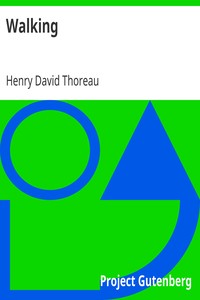Walking by Henry David Thoreau
"Walking" by Henry David Thoreau is an essay written in the mid-19th century, reflecting the transcendentalist philosophy of the time, which emerged in the early 1800s. This work serves as an exploration of human connection with nature, emphasizing the importance of walking as a method of experiencing and interpreting the natural world. The essay contrasts the life of a simple walker with the congested urban existence that disassociates individuals from the freedom
and wildness inherent in nature. In "Walking," Thoreau expresses a profound appreciation for nature and the act of sauntering through it, advocating for the necessity of wild spaces as essential for human well-being and creativity. He laments the way civilization threatens natural landscapes but asserts that true freedom and discovery arise from immersive experiences in nature. Through his articulate prose, Thoreau highlights themes of individualism, reflection, and a return to the wild, suggesting that a meaningful life is found in our relationship with the natural world rather than in societal conventions or material pursuits. The essay encourages readers to embrace solitude and stillness found in nature as a path to personal understanding and a richer existence. (This is an automatically generated summary.)
Read or download for free
| How to read | Url | Size | |||
|---|---|---|---|---|---|
| Read now! | https://www.gutenberg.org/ebooks/1022.html.images | 94 kB | |||
| EPUB3 (E-readers incl. Send-to-Kindle) | https://www.gutenberg.org/ebooks/1022.epub3.images | 107 kB | |||
| EPUB (older E-readers) | https://www.gutenberg.org/ebooks/1022.epub.images | 106 kB | |||
| EPUB (no images, older E-readers) | https://www.gutenberg.org/ebooks/1022.epub.noimages | 94 kB | |||
| Kindle | https://www.gutenberg.org/ebooks/1022.kf8.images | 193 kB | |||
| older Kindles | https://www.gutenberg.org/ebooks/1022.kindle.images | 187 kB | |||
| Plain Text UTF-8 | https://www.gutenberg.org/ebooks/1022.txt.utf-8 | 87 kB | |||
| Download HTML (zip) | https://www.gutenberg.org/cache/epub/1022/pg1022-h.zip | 105 kB | |||
| There may be more files related to this item. | |||||
Similar Books
About this eBook
| Author | Thoreau, Henry David, 1817-1862 |
|---|---|
| Title | Walking |
| Note | Reading ease score: 71.7 (7th grade). Fairly easy to read. |
| Note | Wikipedia page about this book: https://en.wikipedia.org/wiki/Walking_(Thoreau) |
| Credits | Q Myers, and David Widger |
| Language | English |
| LoC Class | PS: Language and Literatures: American and Canadian literature |
| Subject | Essays |
| Subject | Walking |
| Subject | Nature |
| Category | Text |
| EBook-No. | 1022 |
| Release Date | Aug 1, 1997 |
| Most Recently Updated | Jan 15, 2021 |
| Copyright Status | Public domain in the USA. |
| Downloads | 1141 downloads in the last 30 days. |
| Project Gutenberg eBooks are always free! | |

